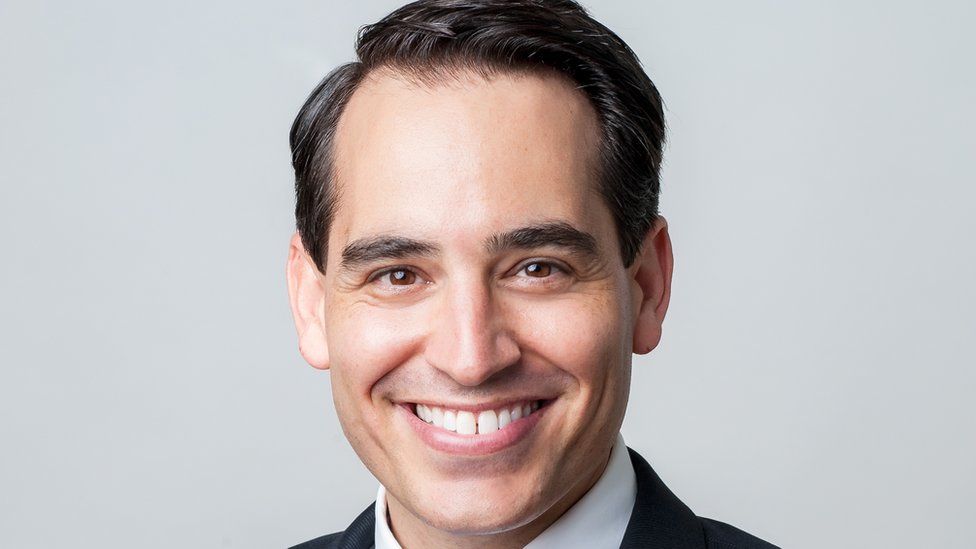Why Bill Clinton helped a 33-year-old build a $1bn firm
- Published

If you are going to get someone famous to launch your global business officially, it is hard to do better than President Bill Clinton.
Yet as Andy Kuper will attest, it can be a nerve-racking experience.
Back in September 2008, President Clinton was so impressed with Andy's new company, Leapfrog Investments, that he decided he would unveil it during his keynote speech at the annual meeting of his Clinton Global Initiative foundation.
It meant that President Clinton would invite the then 33-year-old Andy on to the stage to speak to the few hundred attendees at the event in New York.
Andy says: "I had done a lot of public speaking before, but this was a rock 'n' roll thing. I was worried about stumbling on the stairs and falling on the president."
Thankfully for Andy, he managed to stay on his feet and give a speech that wasn't too overshadowed by President Clinton's well-known oratorical talents.
Andy says: "President Clinton was amazing, he is an incredible public speaker, I owe him a great deal."
But why was President Clinton so impressed with a South African businessman he had only recently met?
Andy had ambitious plans to help transform the lives of hundreds of millions of people in the developing world, to help pull them out of poverty.
Instead of giving them aid, his plan was to invest in, help run and expand indigenous companies, mostly insurance and healthcare funds, so that populations would not be blighted by ill-health.
And instead of being a charity or non-profit organisation, Leapfrog planned to be very much profit-making and offer its investors a decent rate of return. The idea was to make globalisation and capitalism work for the world's poorest people.
After a very slow start, the business today has more than $1bn (£800m) of funds on its books. It currently invests in 16 companies across 22 countries in Africa and Asia that have a combined 100,000 employees and serve 91 million people.
Teenage investor
The son of anti-apartheid campaigners and brought up on a farm outside of Johannesburg, Andy doesn't seem qualified to run a global investment firm on first glance at his CV.
He has no business qualifications and instead studied philosophy at university, before going on to lecture in the subject.
Yet he started investing in the stock market aged 10, using money he made from selling the family's crops on the side of the road. By aged 13, he was making money for clients.
After attending the University of the Witwatersrand in Johannesburg, Andy went to Cambridge University. It was while at Cambridge that Andy spent a summer working for a non-government organisation in India, which he said was "one of his most formative experiences" and is the genesis of his future idea for Leapfrog.
"We were trying to get Indian farmers to adopt drip irrigation, which could triple their production and lift them out of poverty," says Andy, now 41.
"But they just wouldn't do it. At the time, I thought they were being so irrational, but they weren't - they weren't prepared to take the risk of doing something new and seeing their crops fail as a result. Why? Because this would have meant that their children starved.
"So I thought, why don't we give these people a safety net to enable them to take a chance on bettering themselves, such as insurance cover."
'Profit with purpose'
After spending his 20s lecturing and heading up an organisation that supports social entrepreneurs, Andy started work on Leapfrog. Initially, he got nowhere fast, because, he says, the idea was so new.
He says: "It seemed close to impossible to begin with, but I just believed so fundamentally in the idea, which I call profit with purpose, of investing in companies that serve the other half of humanity - the four billion people that conventionally have not been served."
With no money coming in, Andy had to live off his and his wife's savings until Leapfrog got its first small investment after a year and a half.
The Clinton connection then followed, thanks to Andy knowing someone who worked for the organisation.
However, the president's September 2008 speech failed to immediately open the investment floodgates, because it was quickly overshadowed by global events.
A week later, investment bank Lehman Brothers collapsed and the world was plunged into the global financial crisis.
Yet despite this backdrop, Leapfrog was able to secure $135m of investment by late 2009. Today its institutional investors include Goldman Sachs, Axa, JP Morgan, AIG, Swiss Re and the European Investment Bank.
Companies that Leapfrog invests in and helps run include All Life, a South African insurance firm that gives low cost cover to people with HIV, Kenyan pharmacy chain Goodlife, and India's Mahindra Insurance Brokers. Andy says that Leapfrog helps the firms see revenues grow by an average 43% per year.
Robert van Zwieten, president of Emerging Market Private Equity Association, the trade group for firms that invest in the developing world, says that Andy and Leapfrog have been "trailblazers" in helping to create a new industry known as "impact investing". These are firms that invest both to make money and to achieve a positive social impact.
He adds: "The annual World Economic Forum (WEF) event at Davos has for several years been struggling to work out how to make globalisation and capitalism work for the many and not just the few, but Andy and his team at Leapfrog are already doing just that."
Now based in Sydney, Australia, after previously being in New York, Andy says: "You can do more good if you are profitable, and make more profit because you are good [doing virtuous things]."
Follow The Boss series editor Will Smale on Twitter @WillSmale1